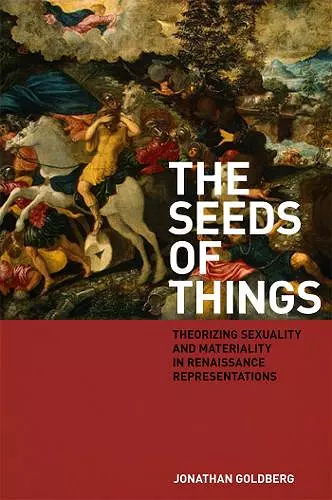The Seeds of Things
Theorizing Sexuality and Materiality in Renaissance Representations
Format:Paperback
Publisher:Fordham University Press
Published:1st Jul '09
Currently unavailable, and unfortunately no date known when it will be back
This paperback is available in another edition too:
- Hardback£74.00(9780823230662)

The title of this book translates one of the many ways in which Lucretius names the basic matter from which the world is made in De rerum natura. In Lucretius, and in the strain of thought followed in this study, matter is always in motion, always differing from itself and yet always also made of the same stuff. From the pious Lucy Hutchinson’s all but complete translation of the Roman epic poem to Margaret Cavendish’s repudiation of atomism (but not of its fundamental problematic of sameness and difference), a central concern of this book is
how a thoroughgoing materialism can be read alongside other strains in the thought of the early modern period, particularly Christianity.
A chapter moves from Milton’s monism to his angels and their insistent corporeality. Milton’s angels have sex, and, throughout, this study emphasizes the consequences for thinking about sexuality offered by Lucretian materialism. Sameness of matter is not simply a question of same-sex sex, and the relations of atoms in Cavendish and Hutchinson are replicated in the terms in which they imagine marriages of partners who are also their doubles. Likewise, Spenser’s knights in the 1590 Faerie Queene pursue the virtues of Holiness, Temperance, and Chastity in quests that take the reader on a path of askesis of the kind that Lucretius
recommends and that Foucault studied in the final volumes of his history of sexuality.
Although English literature is the book’s main concern, it first contemplates relations between Lucretian matter and Pauline flesh by way of Tintoretto’s painting The Conversion of St. Paul. Theoretical issues raised in the work of Agamben and Badiou, among others, lead to a chapter that takes up the role that Lucretius has played in theory, from Bergson and Marx to Foucault and Deleuze.
This study should be of concern to students of religion, philosophy, gender, and sexuality, especially as they impinge on questions of representation.
"An impressive harvesting of a range of modern theories of materialism and ethical selfhood and an immensely fertile use of them for the original interpretation of culturally important texts." -- -Judith H. Anderson Indiana University "Goldberg's new book will be required reading for anyone writing about 'the material.' By thinking about materialism through Lucretius and his impact on early modern writers from Spenser to Hutchinson, Cavendish and Milton, in relation to Renaissance painting and to the Pauline tradition, Goldberg rethinks source study by working through important theoretical and philosophical problems while engaged in close reading. The Seeds of Things offers a cogent, learned and powerful non-essentialist theoretical argument about sexuality that eschews dominant paradigms that remain heavily invested in anachronistic notions of identity and it intervenes importantly in recent debates about the so-called 'post-human.' " -- -Karen Newman Brown University "Illuminates Cavendish's vitalism and the hinds of homoeroticism in Spenser (the Garden of Adonis) and in Milton (among the angels and between Adam and Raphael." -Renaissance Quarterly " ... philosophically, aesthetically, and conceptually challenging ..." -Studies in English Literature "The Seeds of Things excavates an excitingly radical strain of Lucretian materialism that wends its way through Renaissance painting and literature all the way to the work of Deleuze and Foucault. From the logic of atomic sameness and difference, the aleatory and the linear, Jonathan Goldberg derives a vision of complexly gendered bodies, their pleasures, and their ethics. In so doing he recasts works we thought we already knew. As unexpected as it is brilliant, this book is itself a surprising, Lucretian swerve in Goldberg's rich and distinguished career." -- -Richard Halpern Johns Hopkins University "This dazzling display of erudition advances studies of materialism... Highly recommended." -Choice "The Seeds of Things is an absorbing, beautiful, and vibratory book, which celebrates and enacts the vitality of the matter that we are. Goldberg picks up where Althusser left off, exposing a powerful underground current of an aleatory materialism in Euro-American culture, a 'secret other history of philosophy that belies its resolute idealism.' A multi-disciplinary tour de force." -- -Jane Bennett Johns Hopkins University
ISBN: 9780823230679
Dimensions: unknown
Weight: unknown
256 pages